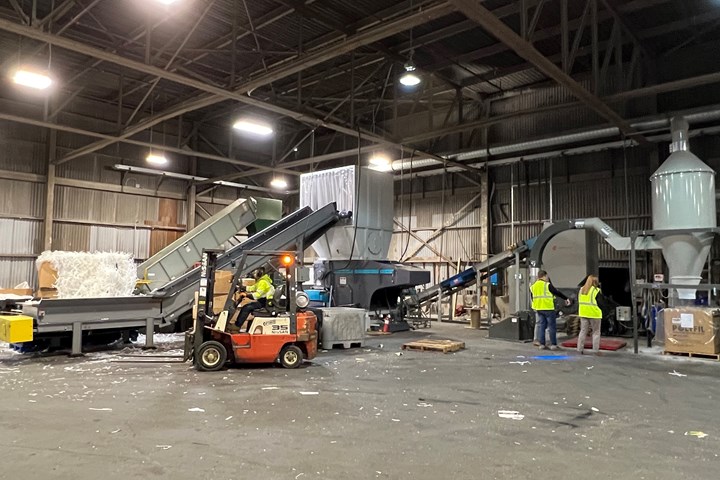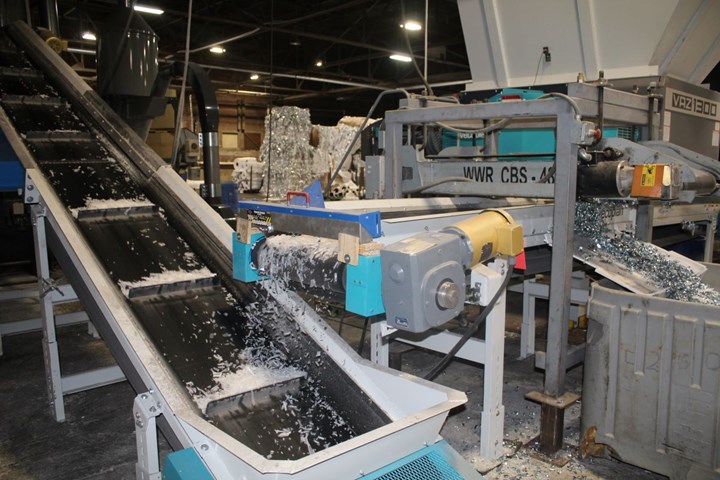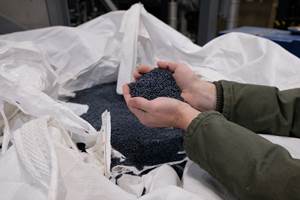Purpose-Built System Enhances Capacity and Flexibility for Recycler
A Boston recycler invested in a turnkey shredding, granulation and elutriation system to expand its plastics reclaim business.
Originally operating a single truck, Boston waste-management company Save that Stuff recently embarked on a mission to provide alternatives to traditional waste disposal, helping businesses dispose of recoverable plastics that may otherwise be landfill-bound.

Save That Stuff’s new recycling line processes hangers. (Photos: Cumberland)
Save that Stuff, which was founded in 1990 by CEO Erik Levy, provides waste-management services for a wide range of materials. It recently found opportunities to expand its plastic recycling operations, including a contract to recycle PP plastic clothes hangers from a major U.S. retailer. To do so, they needed to upgrade their recycling equipment. They turned to Cumberland.
“They had an older system and had been looking for a solution for a while, something that would add flexibility and also modernize their operation,” said Cory Gagnon, senior marketing specialist at Cumberland.
The team at Cumberland worked with Save that Stuff to devise a turnkey solution that would not only increase the volume of plastics that they could process, and deal with the particular challenges of reprocessing hangers, but also provide the flexibility to prepare for future business opportunities.
Cumberland provided a turnkey solution, comprised primarily of a Vecoplan shredder, a Cumberland granulator and a Sterling Blower elutriation system. The basics of the system are the same as would be used for any rigid plastic.
“There’s really no difference when it comes to cutting-chamber style, so we are looking at wear packages and options to help the equipment last longer, sizing for throughput, and adding options,” says Joe Platek, business development manager at Cumberland.
A configuration option particular to the Save that Stuff project addressed the need to deal with hangers, a product composition that requires special consideration.
Recycling Assembled Products with Multiple Materials
The hangers being processed by Save that Stuff are of the type assembled from both plastic (PP) and metal components (such as the clips used to hold pants) often used in retail environments.
“It can go through the shredder, but we don’t recommend any kind of metal going through a granulator at all,” explains Andrea Parrillo, regional sales manager at Cumberland.

Handling equipment magnetically separates metal components (at right) from plastic for recycling.
To prevent equipment damage and downstream contamination, these components can be liberated and sorted from the material stream. For this purpose, Cumberland provided a magnetic conveyor system between the shredder and granulator. After the hangers are broken up by the shredder, any ferrous components are pulled up and out of the material stream to prevent them getting into the granulator.
The system also includes metal detection, which alerts the operator if any metal does slip through the sorting step, so that they can take corrective action. After granulation, the PP material is passed to the elutriation system, which suspends and pulls dusts and fines off of the material, leaving the PP granules ready to ship.
Purpose-Built Size-Reduction System with a Flexible Future
Capacity of the new system is estimated to be 2000 lb/hr. The new capacity and versatility have encouraged Save that Stuff to look for new opportunities to increase their plastics recycling operations, currently about 10% of the company’s overall business.
Since implementing the new system, the company has found opportunities in recycling HDPE barrels and spools of the type used to store cable. These products may not have need for metal separation, but many plastic waste products do. Beyond hangers, examples include bumper fascias and spray bottle caps.
Related Content
Extrusion Technology Extended to Injection, Enabling Up to 100% Regrind Usage
Twin-barrel (shot-pot) press can handle more regrind, offers other benefits to molders.
Read MoreNew Facility Refreshes Post-Consumer PP by Washing Out Additives, Contaminants
PureCycle prepares to scale up its novel solvent recycling approach as new facility nears completion.
Read MoreOptical Sorting for Color Flexibility in Recycled Plastics
Aaron Industries added optical sorting to its operation, expanding capabilities to meet the color needs of customers.
Read MoreMultilayer Solutions to Challenges in Blow Molding with PCR
For extrusion blow molders, challenges of price and availability of postconsumer recycled resins can be addressed with a variety of multilayer technologies, which also offer solutions to issues with color, processability, mechanical properties and chemical migration in PCR materials.
Read MoreRead Next
See Recyclers Close the Loop on Trade Show Production Scrap at NPE2024
A collaboration between show organizer PLASTICS, recycler CPR and size reduction experts WEIMA and Conair recovered and recycled all production scrap at NPE2024.
Read MorePeople 4.0 – How to Get Buy-In from Your Staff for Industry 4.0 Systems
Implementing a production monitoring system as the foundation of a ‘smart factory’ is about integrating people with new technology as much as it is about integrating machines and computers. Here are tips from a company that has gone through the process.
Read MoreFor PLASTICS' CEO Seaholm, NPE to Shine Light on Sustainability Successes
With advocacy, communication and sustainability as three main pillars, Seaholm leads a trade association to NPE that ‘is more active today than we have ever been.’
Read More


























